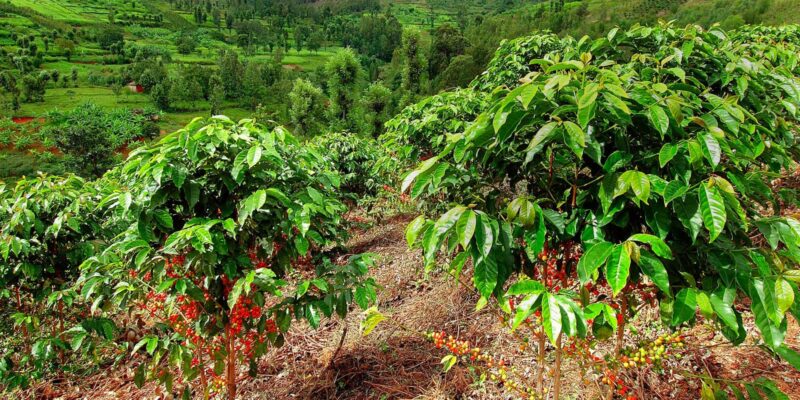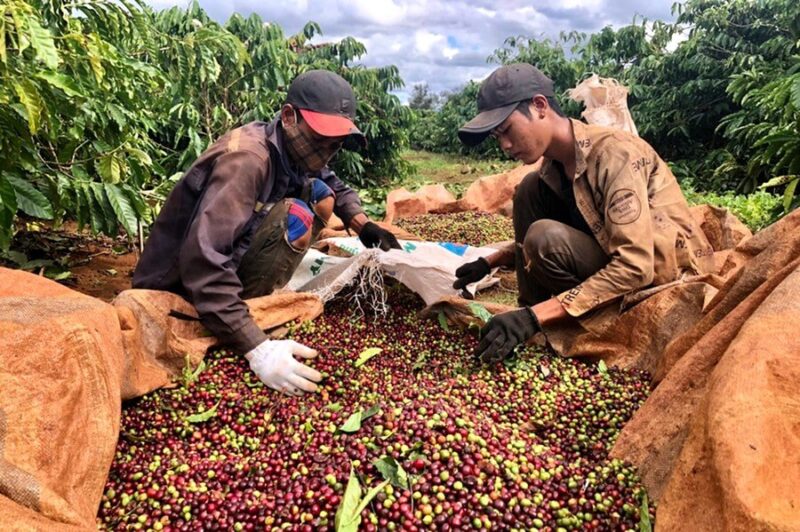The EU’s anti-deforestation law can be a lever to promote the coffee industry to develop towards improving quality along with environmental protection.
The EU accounts for 38% of Vietnam’s total coffee exports
Table of Contents
The Import-Export Department of the Ministry of Industry and Trade said that the European Union is a large coffee market, accounting for about 38% of Vietnam’s total coffee exports each year. In the top 10 markets importing the most coffee from Vietnam, there are 5 EU countries.
The EU is also the world’s largest coffee importing region, with about 33-35% of the global market share. The scale of coffee consumption in this market in 2024 is expected to reach nearly 48 billion USD and will increase to over 58 billion USD in 2029.


In recent months, many European importers have focused on buying Vietnamese coffee as the deadline for implementing anti-deforestation regulations approaches. Thereby, pushing Vietnamese coffee prices to the highest level in the world. Currently, coffee prices have increased to 111,800 – 112,200 VND/kg domestically.
EU anti-deforestation laws requiring key agricultural imports (coffee, cocoa, palm oil, soybeans, livestock, rubber and timber) not to be produced on deforested land have been postponed. applies for an additional year.
Thus, countries have more time to better prepare for deployment. In the Central Highlands provinces, the coffee production and export industry has been taking steps to meet all strict regulations, especially the issue of environmentally responsible production.
Enterprises deploy coffee cultivation to adapt to European standards
This is a high-quality coffee garden, cared for, harvested and subjected to rigorous processing and preservation stages for export to Europe. To achieve certifications such as UTZ and Rain forest, producers must prove that their products on Google Earth are not related to deforestation. This criterion is periodically and regularly checked by the Rainforest Alliance organization.
Mr. Le Dinh Tu – Director of Minudo Farm – Care Company, Dak Lak said: “We are always aware of what we do. First of all, we must protect the environment and protect the health of ourselves and the community. Then I will make upgraded products with higher value to serve the community and I will have a better income.”


The EU is the market that consumes more than 40% of Vietnam’s coffee output. For our country’s coffee export enterprises, the regulation that agricultural products exported to this market must not be grown on deforested or degraded land is creating challenges but also a new motivation for them. strategy to develop the coffee industry in a sustainable way.
Mr. Nguyen Ngoc Quang – Deputy Director of Intimex Group Joint Stock Company Buon Ma Thuot, Dak Lak shared: “We build a traceability system, including a positioning system and boundaries between gardens. . We collaborate with international organizations to implement sustainable landscape programs; Besides, we always coordinate with the People’s Committees of districts, communes and towns to collect farmer information to ensure EUDR requirements.”
European consumers in particular and the world in general are increasingly interested in safe agricultural products. Therefore, the EU’s anti-deforestation law can be a lever to promote the coffee industry to develop towards improving quality along with environmental protection.
Raising awareness for coffee producers
In the context of climate change, in many places, farmers have outdated farming techniques, overuse of chemical fertilizers causes ecosystem degradation, and coffee encroachment on forestry land still occurs. Therefore, the EU’s strict regulations are both a challenge and an opportunity for us to make even greater efforts in transparency from production to consumption, the first key is to raise awareness for farmers. people from the production stage.
Hundreds of households, most of whom are ethnic minorities, are being trained on coffee production to adapt to climate change, improve productivity and quality of coffee beans, as well as apply effective methods. practice sustainable farming, improve soil quality and protect the health of producers.
Dak Nong province – the locality with the third largest coffee area and output in the country – currently has about 142,000 hectares of coffee. Although about 100,000 hectares of coffee have been granted land use rights certificates, only about 23,500 hectares are produced according to voluntary sustainability standards such as 4C and Rainforest.
Mr. Pham Tuan Anh – Director of the Department of Agriculture and Rural Development of Dak Nong province commented: “Faced with specific regulations of the European Union, currently, the agricultural sector is actively products, build zoning maps for risk levels for the coffee industry. Second, we coordinate with organizations to develop a set of communication materials as well as an action framework for this program. Third, we actively call on a number of businesses to accompany local farmers in organizing production to reduce emissions and support traceability.”
Mr. Bach Thanh Tuan – Vice Chairman of the Vietnam Coffee and Cocoa Association commented: “It is necessary to strengthen the role of communication so that the community understands and is aware that we not only produce and create value to meet daily life, but we also have to be responsible in protecting reputation, national brand as well as long-term development responsibility.
Projects practicing sustainable coffee farming that meet EU anti-deforestation regulations are being widely deployed in the Central Highlands provinces, to contribute to the sustainable development and position of the coffee industry. Vietnam when exporting to Europe and the global market.
